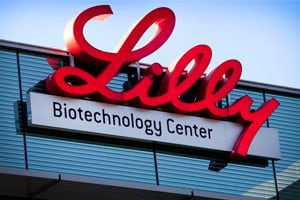
Drug maker Eli Lilly & Co. announced on Monday that it had halted work on an experimental heart drug, after the drug, evacetrapib, failed to perform well in a clinical study. Lilly said Monday it was discontinuing development of evacetrapib, which was designed to ward off heart attacks and other cardiovascular problems by modifying cholesterol […]

Eli Lilly Halts Work on Heart Drug
Lilly said Monday it was discontinuing development of evacetrapib, which was designed to ward off heart attacks and other cardiovascular problems by modifying cholesterol levels, the Wall Street Journal reports.
Interim results from a large clinical trial showed that evacetrapib was not likely to significantly reduce cardiovascular risk versus a placebo, despite having the desired effect on cholesterol levels. According to the WSJ, Lilly’s decision was not based on safety findings.
Evacetrapib is a cholesterol esterase transfer protein (CETP) inhibitor, a class of drugs that lowers LDL (the “bad”) cholesterol. This class of drugs has so far had a disappointing development history, Medscape reports. Torcetrapib and dalcetrapib, two earlier drugs in this class, were both pulled from the pipeline. In a large trial, torcetrapib showed an increased risk of mortality and cardiovascular events and dalcetrapib failed to show a benefit.
ACCELERATE, a phase-3 randomized trial, had enrolled 12,095 patients in 37 countries with diabetes, a history of acute coronary syndrome, statin-resistant dyslipidemia, and other high-risk features. The study was following them for the composite end point of CV death, heart attack, stroke, revascularization, or hospitalization for unstable angina. The trial had been scheduled to continue for another year, but the trial’s data safety monitoring board recommended the trial be stopped based on a prespecified data review that “suggested there was a low probability the study would achieve its primary end point based on results to date,” according to a statement from Lilly, Medscape reports.
The WSJ reports that Lilly’s stock plummeted after the announcement. The company has been recovering from a series of patent expirations that slashed sales of older blockbuster medicines like Zyprexa and Cymbalta for mental illnesses. Once a patent expires, other drug makers can enter the market with a generic version of the drug, usually bringing down the price of the brand name drug. Lilly had won regulatory approval to market three new drugs since the beginning of 2014, and several experimental treatments under development looked promising, helping drive up Lilly’s shares to a 10-year high last month. But the announcement about evacetrapib caused Lilly’s shares to drop 7.8 percent. Lilly is awaiting regulatory decisions on potential new drugs for lung cancer and psoriasis, and is running late-stage studies of drugs for arthritis and breast cancer.
Lilly, which has steered clear of megamergers, is smaller than its main rivals in terms of sales and market value, meaning that one drug’s failure can have a big impact on Lilly’s financial outlook. The company’s chief executive, John Lechleiter, said he wants to avoid large-scale mergers because past deals in the industry have disrupted drug research efforts. But the WSJ notes that bigger drug makers have a cushion Lilly does not have when research and development difficulties occur.


